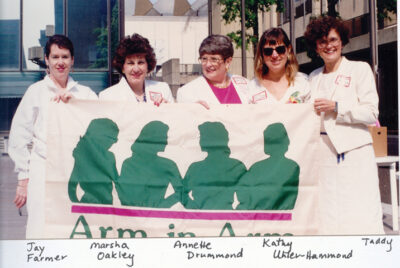In an interview with the Cancer History Project, Kay Dickersin, one of the early leaders of the grassroots breast cancer patient advocacy movement, recounted the beginnings of the National Breast Cancer Coalition.
A Q&A with Dickersin appears here.
She recalls how the coalition began in 1991. One of NBCC’s first initiatives was the Do the Write Thing Campaign, a movement to send letters urging the federal government to appropriate more funding for breast cancer research.
The following archives include photos provided by Dickersin from this 1991 campaign, as well as archives on major milestones of NBCC.
Spotlight article: Photo archive of NBCC’s 1991-1992 Do the Write Thing Campaign






- Photo Archive: National Breast Cancer Coalition’s 1991-1992 Do the Write Thing Campaign
By the Cancer History Project | Jan. 13, 2023
The National Breast Cancer Coalition launched its Do the Write Thing Campaign in 1991, which set out to deliver 175,000 letters to Congress and the president. Ultimately, the campaign resulted in more than 600,000 letters delivered to Congress and the president.
“That was the easiest thing to do,” Kay Dickersin, MA, PhD, professor emeritus, Johns Hopkins Bloomberg School of Public Health, said to The Cancer History Project. “We went out to light rail stops, etc., and we got all our required signatures on petitions.”
This archive includes photos from NBCC’s Do the Write Thing Campaign in 1991, as well as photos from a rally for Dickersin’s Baltimore-based breast cancer advocacy group, Arm-in-Arm, in May 1992. Photos are provided courtesy of Kay Dickersin.
Major milestones: National Breast Cancer Coalition


- An Armchair Discussion with Fran Visco on NBCC’s History
By National Breast Cancer Coalition | Sept. 7, 2022
The National Breast Cancer Coalition’s (NBCC) 2022 Advocate Leadership Summit included a special armchair discussion with NBCC president Fran Visco.
Paul Goldberg, editor and publisher of The Cancer Letter sat down with Fran to interview her about NBCC’s history.


- The National Breast Cancer Coalition’s Project LEAD Institute
By National Breast Cancer Coalition | Sept. 6, 2022
Project LEAD is the National Breast Cancer Coalition’s premier science training program for activists that has created a revolution in the world of breast cancer research and public policy. The course prepares graduates to engage in the wide range of local and national forums where breast cancer decisions are made. Project LEAD graduates bring an educated consumer perspective and critical thinking skills to the important issues and controversies in breast cancer.
As a result of NBCC’s work, scientists, government agencies and private industry have changed the way they design and implement breast cancer research and programs. NBCC has created a model for consumer influence marked by transparency, innovation and a peer relationship among scientists, researchers, policymakers and consumers nationwide.
Click here to view a 2013 video about the development and history of Project LEAD.


- National Breast Cancer Coalition Accomplishments and Milestones
By National Breast Cancer Coalition | May 7, 2021
NBCC has been revolutionizing breast cancer since it was formed in 1991 to address the critical need for a coalition of breast cancer organizations to work together and end breast cancer through action and advocacy.
This was a revolutionary vision at the time, and NBCC’s track record of success demonstrates the effectiveness of this strategy. Our bold, determined, and strategic advocacy has changed the breast cancer landscape, and NBCC continues to shape crucial breast cancer public policy and research.


- NBCC: An Evaluation of Work Over the Breast Cancer Deadline 2020 Period
By National Breast Cancer Coalition | April 7, 2021
This evaluation centers on the impact of the National Breast Cancer Coalition’s (NBCC) research and advocacy programs and efforts, with an emphasis on NBCC’s work after NBCC announced the Breast Cancer Deadline 2020 in 2010. I used documents, meeting minutes and agendas, press releases, scholarly literature, and interviews with NBCC leadership and affiliated researchers to examine the impact NBCC has made in lives and in the larger breast cancer research and advocacy ecosystem.
This column features the latest posts to the Cancer History Project by our growing list of contributors.
The Cancer History Project is a free, web-based, collaborative resource intended to mark the 50th anniversary of the National Cancer Act and designed to continue in perpetuity. The objective is to assemble a robust collection of historical documents and make them freely available.
Access to the Cancer History Project is open to the public at CancerHistoryProject.com. You can also follow us on Twitter at @CancerHistProj, or follow our podcast.
Is your institution a contributor to the Cancer History Project? Eligible institutions include cancer centers, advocacy groups, professional societies, pharmaceutical companies, and key organizations in oncology.
To apply to become a contributor, please contact admin@cancerhistoryproject.com.




